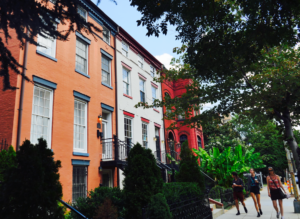Size Matters! Profitability of Short-Term Rentals in DC
Three and four bedroom homes in the District of Columbia are more profitable as vacation rentals, while smaller properties net bigger profits as long-term rentals, according to a new study by two companies in the rental/short-term rental business.
Washington, DC
1BR: Long Term Rental, 98.46% Premium
2BR: Long Term Rental, 27.29% Premium
3BR: Vacation Rental, 2.74% Premium
4BR: Vacation Rental, 13.01% Premium
Profitability of DC short term rentals like Airbnb, and long term rentals of a year or more, depends on the size of your property, according to a new study by RentHop and AirDNA, (based on their own data), which says smaller homes are more profitable as long-term rentals and larger homes are more profitable as short-term rentals: This study focused on how rental property owners across the largest 50 U.S. cities can maximize rental profits. To calculate the long-term rental median by bedroom count, they analyzed over 1.6 million rental listings created on RentHop between March 1, 2022 and August 31, 2022. Then they calculated the monthly net operating income by bedroom count based on 50% operating expenses. For the purpose of this study, they included only one-bedroom, two-bedroom, three-bedroom, and four-bedroom properties.
Monthly vacation rental net operating income was calculated using data supplied by AirDNA, including daily average rates, total nights booked, and available listings between March 2022 and August 2022. The study assumed 50% operating expenses for property owners to run a vacation rental. In addition, to fairly compare vacation rental and long-term rental profits, only entire-unit vacation rental bookings were included in the dataset. These ‘profitability premiums’ were based on general data and don’t take into account the impact of short-term rental restrictions imposed by the District of Columbia (and many other cities and counties).
2022 DC Short Term Rental Requirements
There are two license types available to homeowners in the District. A property can have both:
- Short-Term Rental License: This license allows a host to offer fee-based lodging at their primary residence while the host is present on the property (partial property rental; for example, renting a bedroom within a home). As long as the host is present, there is no limit on the number of stays allowed during a calendar year, but each short-term rental stay is limited to 30 or fewer continuous nights.
- “Primary residence” — the property is eligible for the homestead deduction pursuant to D.C. Official Code § 47-850. For the purposes of short-term rentals, accessory dwelling units, including English basements, are considered part of a host’s primary residence.
-
“Short-term rental” — paid lodging for transient guests with the host present, unless it is a vacation rental. A short-term rental is not a hotel, inn, motel, boarding house, rooming house, bed and breakfast, or a rental unit within the meaning of Section 103(33) of the Rental Housing Act of 1985, effective July 17, 1985 (D.C. Law 6-10; D.C. Official Code § 42-3501.03(33)) or Section 103(16) of the Rental Housing Conversion and Sale Act of 1980, effective September 10, 1980 (D.C. Law 3-86; D.C. Official Code § 42-3401.03(16)). A short-term rental operates within a portion of the host’s primary residence, unless it is a vacation rental.
- Short-Term Rental: Vacation Rental License: A “Vacation Rental” allows a host to offer fee-based lodging at their primary residence without being present on the property (full property rental). Cumulatively, vacation rentals cannot exceed 90 nights in any calendar year, and each rental is limited to 30 or fewer continuous nights
-
“Vacation rental” — a short-term rental that operates within a host’s primary residence wherein a transient guest has exclusive use of the host’s primary residence during the transient guest’s stay and the host is not present on the premises. A vacation rental is subject to additional restrictions, including § 9904.
SOURCE: Final Rulemaking 68 DCR 012598 (December 3, 2021)
Additionally, most–if not all–condo and coop buildings in the District bar short-term rentals altogether.
And that’s not all! There are fees and taxes:
- Short term rentals will be subject to the 14.95% DC hotel tax
- License cost for a short-term or vacation rental license is $104.50, which includes a $70 processing fee, a $25 endorsement fee, and a 10% technology fee.
Links
Guide to DC Short Term Rental laws
Our Page On DC Short Term Rentals
Crunch all the numbers
Be sure to factor in the costs of a short-term rental, from licensing fees and taxes to restrictions and downtime, when making your term decision.
Either way, rental property in the District can be a great investment. DC is consistently ranked as one of the nation’s top markets, rents are also ranked in the high range, and homes here provide a stronger equity build than most markets. Single-family rentals and multifamily properties are currently 2 of the best-performing real estate asset classes.
You’ll want to work with a Realtor to determine the best locations. The old real estate adage “location, location, location” is still true, all real estate is local, and no one knows your local market better than an experienced Realtor. Your agent will help you search properties aligned with your ideal rental strategy (buy & hold, Airbnb, flips), and goals (high rental income, high cap rate or cash on cash return, affordability, high occupancy rate, strong rental demand). Once a property has piqued your interest, your agent will run a CMA (Comparative Market Analysis) to help determine the fair market value of the property based on the sales of like properties in the same location.[/vc_column_text][vc_column_text uncode_shortcode_id=”419979″]If you’re not a seasoned pro, think about adding a service like Mashvisor or Deal Check to your team. Mashvisor provides data sets that help you analyze property returns based on comparative and predictive data models, evaluate individual properties, even weighs in on potential opportunities with AI investment opportunity scores. Also good resources for new investors. Deal Check allows you to Instantly view each property’s cash flow, cap rate, ROI, profit from sale, acquisition costs and more. You can explore long-term cash flow projections for rentals & BRRRR’s, and profit projections for flips. Deal Check is a good beginner investor resources, as well.
MYND offers free tools like a Cap Rate Calculator, rental property returns and income tax calculator,
For multifamily investors, services like Yardi provide property management software and investment management solutions allowing owners, managers, investors access to information specific to their needs. It’s primarily an accounting platform, but can also be integrated with optional solutions such as:
- Accepting rent payments online
- Screening rental applicants
- Managing calendar tasks like lease expirations, tour dates, etc.
- Communicating with residents via text and email
- Boosting internet search visibility with online marketing and leasing tools
Time is money, after all!
A ‘must have’ tool for beginning investors is Bigger Pockets. Set aside some time to read! Keep in mind that their agent referral service is paid lead generation for agents. Choosing an agent from the Bigger Pockets roster only means that agent was willing to pay for investor leads, not that they know the DC market well or have your best interests at heart!
If you’re interested in purchasing an investment property in Washington DC, give us a call and let’s discuss your needs.

